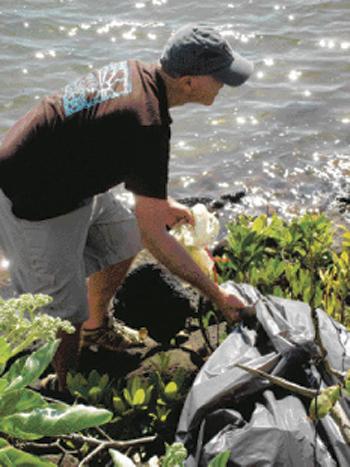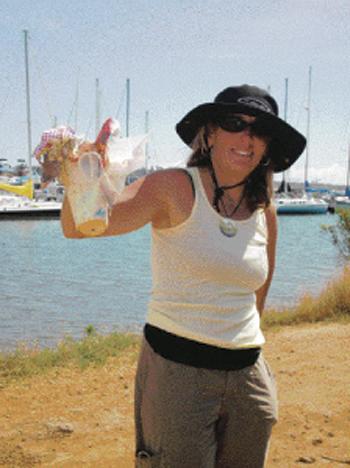NAWILIWILI — As the sun beamed down on the surface of the ocean and reflected its golden light upon the Ha‘upu mountain range Saturday morning at Nawiliwili Harbor, it was difficult for volunteers to face the countless number of beer
NAWILIWILI — As the sun beamed down on the surface of the ocean and reflected its golden light upon the Ha‘upu mountain range Saturday morning at Nawiliwili Harbor, it was difficult for volunteers to face the countless number of beer bottles, cigarette butts and plastic bags strewn across the rocks, threatening to fall into the water.
“Anything and everything we can do to get the trash out of the waters is what we’re all about,” said Diana LaBedz, a volunteer for Surfrider Foundation. The foundation is a national coastal and environmental group that helped organize the Earth Day celebratory harbor clean-up, along with the Sierra Club, U.S. Coast Guard Auxiliary and the Nawiliwili Harbor Yacht Club among others.
Plastic bottles, cigarette butts and straws have become a common sight for LaBedz at beach clean-ups, but she said the most stubborn material to pick up is Styrofoam which breaks down into minuscule pieces that wildlife often mistakes for food once it has been swept out into the ocean.
“It’s very harmful to our wildlife,” she said, adding that plastic can be just as dangerous.
Her husband, Dr. Gordon LaBedz, one of the original founders of Surfrider in 1984, started the Kaua‘i Chapter three years ago and agrees that plastic has become a hazard for every walk of life.
“We want to educate people that all the plastic that’s ever been made is still on the planet and is going to take thousands of years before it goes away and most of it is going into the ocean,” he said.
Surfrider Foundation recently began a national campaign called “Rise Above Plastics,” and is urging people not to use the non-biodegradable material, including bags and water bottles.
However, if plastic water bottles are used, Pooka Johnston, a representative from Aveda who was there on Saturday, mentioned that her company recently launched a campaign where they collect post-consumer material for use in their products, such as unrecyclable plastic bottle caps.
“We collect bottle caps, send them in and recycle and re-use them to make bottle caps for our shampoo and other products,” she said, noting that they are currently working on creating a drop-off site on Kaua‘i where people can take them.
The harbor clean-up brought many eco-chic individuals like Johnston together for the morning and was the only non-beach clean-up Surfrider Kaua‘i arranges every year because “the harbor gets no love,” according to LaBedz.
Surfrider Foundation has also begun to consider the water quality of the island’s rivers, streams and watersheds.
“What we’ve learned is that every time it rains, all the junk and the trash come down to the beach,” he said. “So we’re a beach group, but we have a bigger vision. We look at things like pesticide run-off, plastic bag pollution and all other kinds of issues; anything that winds up at the beach is our issue.”
Dr. Carl Berg, volunteer for Surfrider and project manager for The Blue Water Task Force — Surfrider’s water quality testing program — examines the bacteria count in samples of water across Kaua‘i with a team of volunteers every Saturday.
Of the 12 surf breaks sampled last week, five of them were deemed unsafe, including Wailua, Pinetrees and Kalihiwai.
“We need to identify places that are problematic and try to get to the bottom of the issue,” he said in between collecting bits of plastic and other debris Saturday.
Berg said that weekly counts are posted every Sunday on Surfrider’s Web site.
For more information, visit www.surfriderkauai.ning.com
• Coco Zickos, business writer, can be reached at 245-3681 (ext. 251) or czickos@kauaipubco.com



